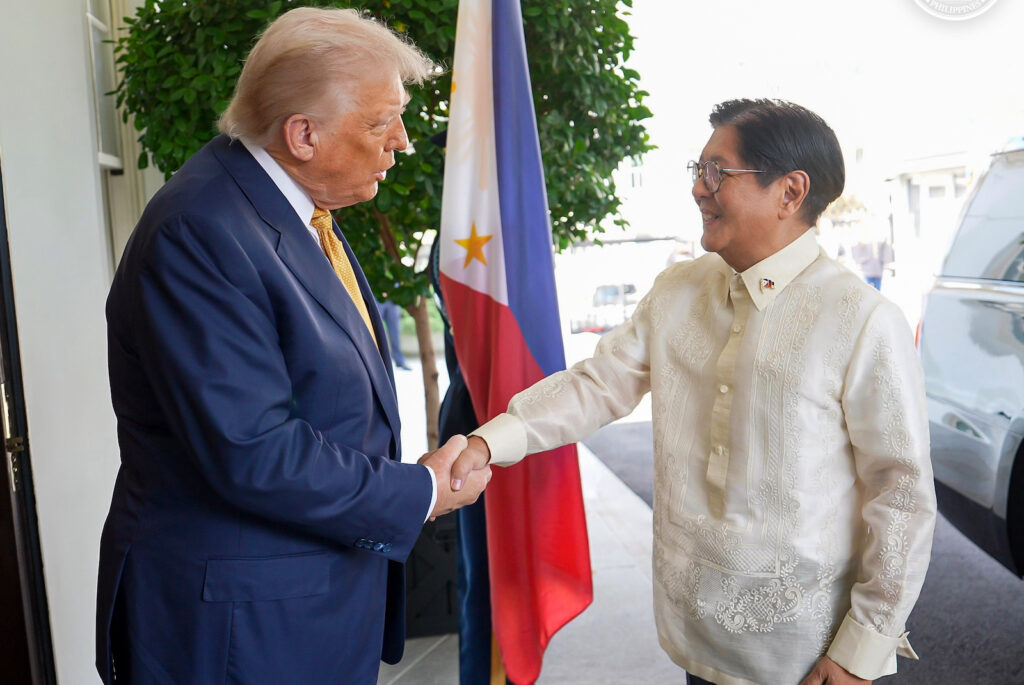MANILA – Philippine President Ferdinand Marcos Jr has met with his US counterpart Donald Trump in Washington, securing pledges for American defense support against China in a long-standing dispute but failing in his quest to significantly cut new US tariffs.
Before heading into their one-on-one meeting at the White House, both leaders reaffirmed the two sides’ “good relationship”, underscored by a long-time mutual defense treaty that binds both nations to coming to each other’s aid in times of foreign aggression.
“We’re going to talk about trade today and we are very close to finishing a trade deal, a big trade deal actually,” Trump told reporters at the start of his meeting with Marcos on Tuesday (US Time), according to transcripts released here.
However, after the meeting, Trump announced on Truth Social that the Philippines had only received a slight change in the planned tariffs on its goods to the US, one of its major trading partners.
“We concluded our Trade Deal, whereby The Philippines is going OPEN MARKET with the United States, and ZERO Tariffs. The Philippines will pay a 19% Tariff,” Trump wrote. This is just 1% lower than what he had earlier threatened, and it remains to be seen how this would impact the Philippines, where many American companies also source their goods.
The two countries did “a lot of business” with each other, Trump said, saying he was surprised to see what he called “very big numbers” that would only grow under a trade agreement.
Marcos is the first Southeast Asian leader to meet Trump in his second term as president of the US. He had already struck trade deals with two other Southeast Asian nations – Indonesia and Vietnam – but has so far stuck to his guns in tough trade negotiations in pursuit of what he earlier referred to as “Liberation Day” for the US economy.
Trump characterized Marcos as a “strong negotiator” but had told reporters earlier that he was optimistic that they will “probably agree on something.”
Marcos, prior to leaving Manila on Sunday, said his visit to Washington builds on the “active exchanges” his government has had with the new Trump administration. He said the meeting with Trump was “essential to continuing to advance our national interests and strengthening our alliances.”
“My top priority for this visit is to push for greater economic engagement, particularly through trade and investment between the Philippines and the United States,” Marcos had said, noting that he intended to tell Washington that the Philippines was prepared to negotiate a trade deal “that will ensure strong, mutually beneficial and future-oriented collaborations that only the United States and the Philippines will be able to take advantage of.”
“And we will see how much progress we can make when it comes to the negotiations with the United States concerning the changes that we would like to institute so as to be able to alleviate the effects of a very severe tariff schedule on the Philippines,” he said.
The Philippines has also consistently stood up to China over the disputed South China Sea, and in a meeting with US defense chief Pete Hegseth ahead of his one-on-one with Trump reaffirmed his commitment to the defense pact.
“I believe that our alliance, the United States and the Philippines, had formed a great part in terms of preserving the peace, in terms of preserving the stability of the South China Sea. But I would even go as far as to say in the entire Indo-Pacific region,” Marcos said.
But the Philippine leader stressed the need for continued bilateral discussions “amid rapidly shifting geopolitical dynamics” even as he pledged continued support for American access to Philippine bases and joint bilateral exercises.
“That forms a very, very important part of that relationship. And again, it is a proper response considering the challenges that we face in the Philippines specifically vis-à-vis the changing geopolitical forces and the political developments around our part of the world,” he said.
He told Hegseth that both nations “must continue to be in discussion” over defense issues, which took a top priority in his administration after his predecessor, Rodrigo Duterte, openly embraced China over the United States.
Marcos, according to his office, was accorded an “enhanced honor cordon upon arrival” at the Pentagon — a ceremonial welcome reserved for high-ranking foreign dignitaries and military leaders.
This distinguished military tradition, involving additional personnel and formalities, reflects the strength of the diplomatic relationship between the two allies, it noted.
Jason Gutierrez was head of Philippine news at BenarNews, an online news service affiliated with Radio Free Asia (RFA), a Washington-based news organization that covered many under-reported countries in the region. A veteran foreign correspondent, he has also worked with The New York Times and Agence France-Presse (AFP).

